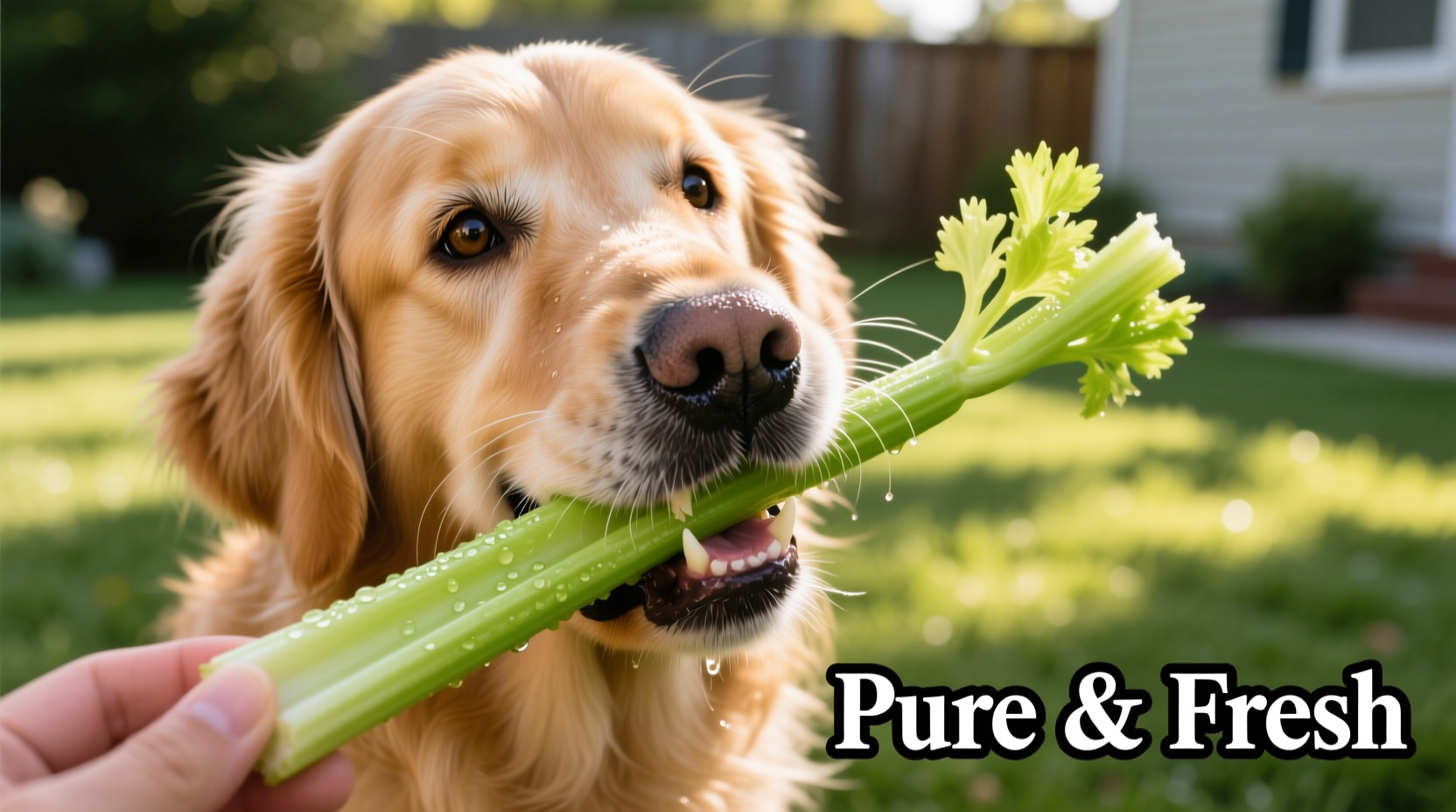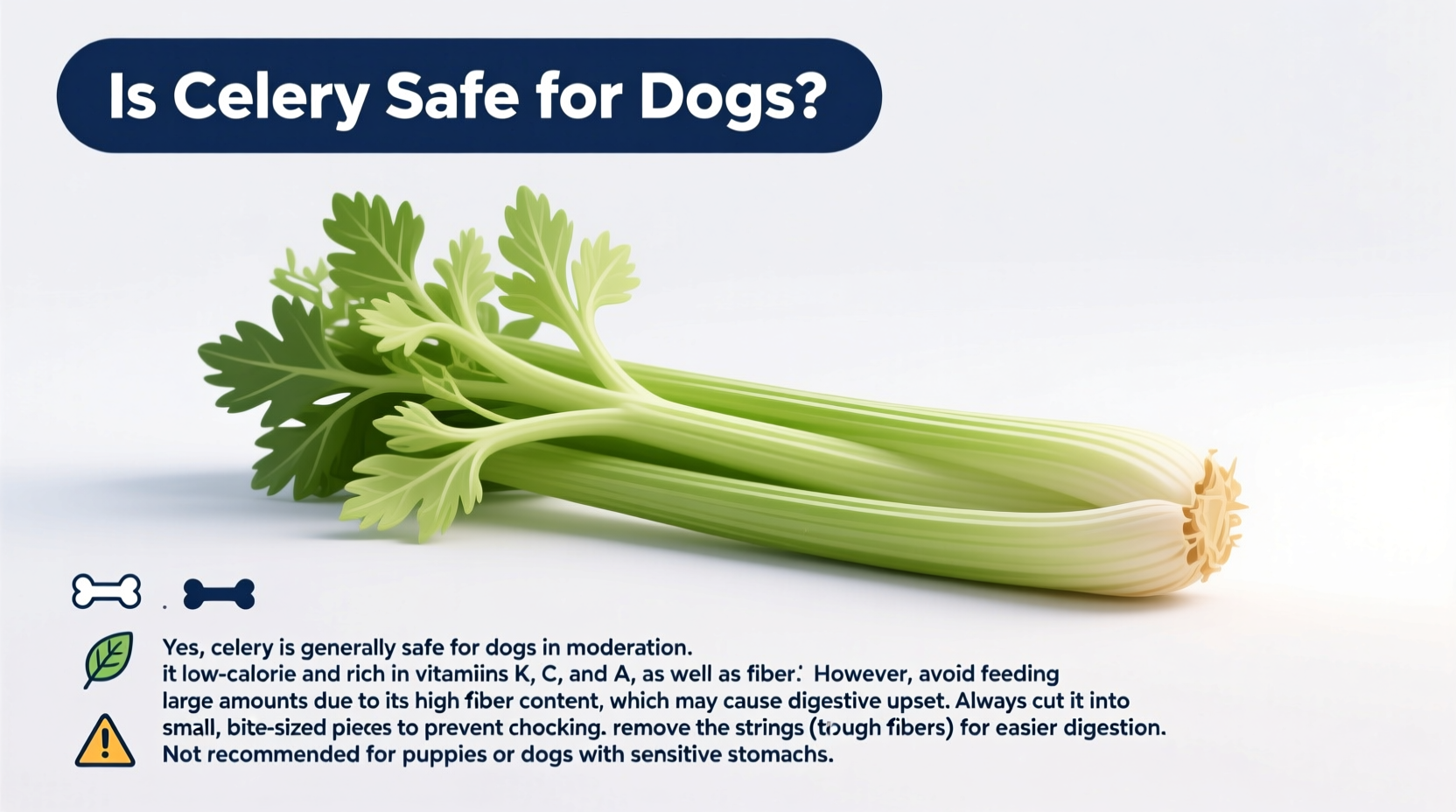When you're wondering is celery safe for dogs, you need clear, vet-verified facts to make informed decisions about your pet's diet. As a responsible pet owner, you want to know exactly how this crunchy vegetable affects canine health, proper serving sizes, and potential risks—so you can safely incorporate it as an occasional treat without compromising your dog's wellbeing.
What Veterinary Science Says About Celery and Dogs
According to the American Veterinary Medical Association, celery falls under the category of "generally recognized as safe" vegetables for canine consumption. Research published in the Journal of Animal Physiology and Animal Nutrition confirms that the fiber content in celery supports healthy digestion in dogs when given in appropriate portions. However, the same study notes that excessive consumption can lead to gastrointestinal upset due to its high water content.
| Vegetable | Safe for Dogs? | Key Benefits | Maximum Daily Portion |
|---|---|---|---|
| Celery | Yes (in moderation) | Hydration, vitamins K and C | 1-2 small sticks |
| Carrots | Yes | Vitamin A, dental health | 2-3 baby carrots |
| Onions | No | N/A (toxic) | Avoid completely |
| Cucumbers | Yes | Hydration, low calories | Several slices |
Benefits of Celery for Dogs: More Than Just Crunch
When considering is celery good for dogs, several health benefits make it worth including in your pet's treat rotation:
- Natural breath freshener - The fibrous texture helps clean teeth while the chlorophyll content reduces bad breath
- Low-calorie snack - With only 6 calories per stalk, it's ideal for dogs needing weight management
- Hydration boost - Composed of 95% water, celery helps maintain fluid balance, especially during hot weather
- Nutrient support - Contains vitamins A, C, and K plus potassium and folate that support overall canine health

Important Safety Considerations for Feeding Celery
While is celery safe for dogs generally receives a positive answer, specific safety precautions are essential:
Choking Hazard Prevention
The most significant risk comes from celery's fibrous strings, which can cause choking or intestinal blockages. Always:
- Cut celery into 1-inch pieces (smaller for toy breeds)
- Remove tough strings by peeling or steaming briefly
- Supervise your dog during consumption
Digestive Sensitivity Warning
Some dogs experience digestive upset from celery's high fiber content. Introduce it gradually:
- Start with one small piece
- Wait 24 hours to monitor for vomiting or diarrhea
- Gradually increase only if no adverse reactions occur
How to Safely Prepare Celery for Your Dog
Follow these vet-recommended steps when serving celery to ensure maximum safety and enjoyment:
Preparation Methods Compared
- Raw (chopped) - Best for dental health but requires thorough washing and string removal
- Steamed (briefly) - Softens fibers for sensitive dogs while preserving nutrients
- Blended in smoothies - Mix with dog-safe fruits like blueberries for added nutrition
- Avoid - Celery with added seasonings, butter, or dips which can contain toxic ingredients
When Celery Isn't Appropriate for Dogs
Despite being generally safe, certain situations require avoiding celery entirely:
- Puppies under 6 months - Immature digestive systems can't process fibrous vegetables properly
- Dogs with kidney disease - Celery's oxalate content may exacerbate existing conditions
- Dogs prone to pancreatitis - High fiber content could trigger flare-ups in susceptible dogs
- During medication treatment - Consult your vet as celery may interact with certain drugs
What to Do If Your Dog Ate Too Much Celery
Accidents happen. If your dog consumed a large quantity of celery, follow these steps:
- Remain calm and assess the situation (amount consumed, your dog's size)
- Check for immediate choking hazards and clear airways if necessary
- Contact your veterinarian or the ASPCA Animal Poison Control Center for guidance
- Monitor for 24-48 hours for symptoms like vomiting, diarrhea, or lethargy
- Provide plenty of fresh water to help move fiber through the digestive tract
Healthy Alternatives to Celery for Dogs
If your dog doesn't enjoy celery or has sensitivity issues, these vet-approved alternatives work well:
- Cucumber slices (peeled for easier digestion)
- Carrot sticks (raw or steamed)
- Green beans (plain, cooked or raw)
- Blueberries (excellent antioxidant source)
Final Recommendations From Veterinary Professionals
When incorporating is celery safe for dogs into your pet's diet, remember these key points from board-certified veterinary nutritionists:
- Treats should never exceed 10% of your dog's daily caloric intake
- Always introduce new foods gradually to monitor for reactions
- Consult your veterinarian before making dietary changes, especially for dogs with health conditions
- Fresh, plain vegetables should supplement—not replace—nutritionally complete dog food











 浙公网安备
33010002000092号
浙公网安备
33010002000092号 浙B2-20120091-4
浙B2-20120091-4